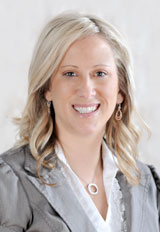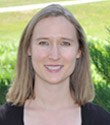Jan 24, 2018
Young Rural Healthcare Leaders Series: Q&A with Stephanie Orr
by Allee Mead
One of four articles in the series Young Rural Healthcare Leaders Share Experiences and Insights.
 Stephanie Orr, Age
34
Stephanie Orr, Age
34
Chief Nursing Officer (CNO), Steele Memorial Medical
Center (Salmon, Idaho)
Steele Memorial Medical Center (SMMC) is an 18-bed Critical Access Hospital.
Education
- BS in Nursing, Brigham Young University-Idaho
- MS in Nursing Administration, Weber State University
- Family Nurse Practitioner degree candidate, Gonzaga University
Accomplishments and Recognition
- Improved nursing care's patient satisfaction
- Led the implementation of several telehealth services, including teleburn and pediatric telepsych
- Presenter at a Studer Group "What's Right in Healthcare" conference
- SMMC named a Top 20 CAH for 2015, 2016, and 2017 by NRHA
- SMMC received awards for patient satisfaction scores in HCAHPS and ED
- Nurse Leaders of Idaho Board Member, 2013-2017
What was your path to your current position as
CNO?
I was completing my BSN and working with our current CNO on my leadership clinicals. She announced her retirement and encouraged me to apply. I laughed at her, thinking she was kidding. I was the youngest and newest nurse at SMMC: 27 years old and had been here two years, with four years of nursing experience. She told me I had the right personality and the drive to do a good job. At the same time, I was also seven months pregnant with my first child. Nursing administration was not in my plan. I went home and cried to my husband, but we both agreed that, if someone was encouraging me to do something, I should do it. I just knew that it would be a big commitment and I had wanted to dedicate five years to the staff nurse position before I thought of going back to school.
I was raised in a little town called Newdale, Idaho, a town of 300 people. I actually lived three miles out of town on a farm. A potato farm. In Idaho! I moved to Salmon in 2009. I married a local. And I was so thrilled that they had a new hospital here; it was built in 2004. To be in a rural community like ours, to know this was where I was going to be for the rest of my life and raise my family, it was so comforting to know that we had a new facility and a thriving community. Our hospital is one of the most remote hospitals in the lower 48 states. The closest hospital to us is 90 miles away. The closest tertiary facility is 150 miles and the other is 160 miles.
When I arrived here, I came as a staff nurse and quickly was put into a leadership role as nursing supervisor, which oversees all the nurse departments. I had started my bachelor's and put it on hold. When I moved here, I decided I needed to get that done as soon as possible. I was three weeks away from graduation when offered the CNO position. Since starting as CNO, I have had three children and obtained two degrees. I graduated with my master's in April 2013. I finished my final paper that Friday and delivered my second child that Sunday.
What has been your most effective innovation at SMMC?
I feel that my most effective innovation has been increasing patient satisfaction scores and changing our culture to sustain it. I became CNO in March 2011; we partnered with a consulting group in May 2011. I am the AIDET champion for the hospital and do an annual training for all staff. AIDET, from our consulting group, stands for Acknowledge, Introduce, Duration, Explanation, and Thank-you. The purpose of AIDET is to communicate better with our patients, our customers, and our employees.
When you complete your annual AIDET validation, you role-play, bringing in mock patients, and those people can be administration or board members. Annually, every single one of our employees goes through this role-play. We use our board members, our auxiliary members, and our administration team to act as the patients. It brought our board members closer to our employees, and they got to see the things that we're doing.
What impact did that innovation have on patients, your facility, and your community?
I started in 2011 as CNO; the following year, we started receiving awards for our HCAHPS (Hospital Consumer Assessment of Healthcare Providers and Systems) and Emergency Department patient satisfaction scores, and we continue to be recognized today. Those are our two areas in which we have continued to do very well. Emergency departments don't normally do well on their patient satisfaction scores, so we've received a lot of recognition for that.
We have some amazing staff who truly care about their patients and do everything they can to make them feel comfortable and decrease their anxiety.
We have some amazing staff who truly care about their patients and do everything they can to make them feel comfortable and decrease their anxiety. One of the biggest compliments we get from people visiting is how friendly everyone is and how clean our hospital is. Those are very important to us.
As a young leader in rural healthcare, what is the biggest challenge you have faced and how did you overcome it?
Going from a Nursing Supervisor to CNO and skipping the manager position, I had to learn all the healthcare lingo. As a staff nurse, you are worried about your patient, not the budget, not the scores, and not the politics of healthcare. My first two years, I had seasoned managers who had been in their positions 10 to 20 years. This allowed me to observe and learn. I didn't have to make big decisions or mentor. In 2013, my first manager retired and, in 2014, the medical-surgical nursing manager retired. She retired one month before our hospital implemented a new electronic medical records system. I had to go through an EMR conversion without her. I was managing that department, pulling nursing shifts, and problem-solving the EMR, besides overseeing the other departments. It was a rough year!
What drives your workplace motivation?
I know there are many others who can do the job I'm doing and probably do it better, but I truly care about this hospital, the community, and our patients. I know that my job is not a clock-in/clock-out position. I am technically on-call 24/7 for anything that happens in my areas. My position oversees ED, Med-Surg/OB, Surgery, Pharmacy, Rehab, and Dietary. That is a big responsibility when you are raising a young family. I love nursing and am so proud of the work our hospital does.
What guidance can you offer to young professionals considering rural hospital leadership?
We all wear multiple hats because we have to. I had a phone call from one of our tertiary facilities the other day, wanting to follow up on a patient. I said I'm sorry I hadn't received the report because I was getting ready to take advanced cardiac/cardiovascular life support but I did visit with the patient yesterday during our lactation training. She laughed and said, "You're the CNO, and you have to do ACLS and you're the lactation consultant?" I said, "Yep!"
Being able to help on the floors, pull shifts, and be involved with patients keeps you in tune to what staff challenges are. If somebody doesn't show up, I may have to come in and pull a shift if my managers are unable to do that. And it's two-fold, because people can take advantage of that and forget all your other responsibilities. You just have to be careful when you put yourself out there. Help them understand that I want to be helpful, but we also want to make sure that we're using appropriate staff and not just going to management or administration.
Leadership is wonderful in a rural hospital. You don't have to be a "suit."
Leadership is wonderful in a rural hospital. You don't have to be a "suit." I had to delay this interview because I had to relieve staff in the ER so they could attend a funeral. During my hour of relief, I was able to place an IV, draw labs, assist in a cardiac procedure on a patient, and start a cardiac drip. I love it! You get to do both: be a nurse and a leader. My administration team puts the patient first, which makes my job easier. We are a close team of administration and managers, and being able to make decisions that affect our patients in a positive way is invaluable.

